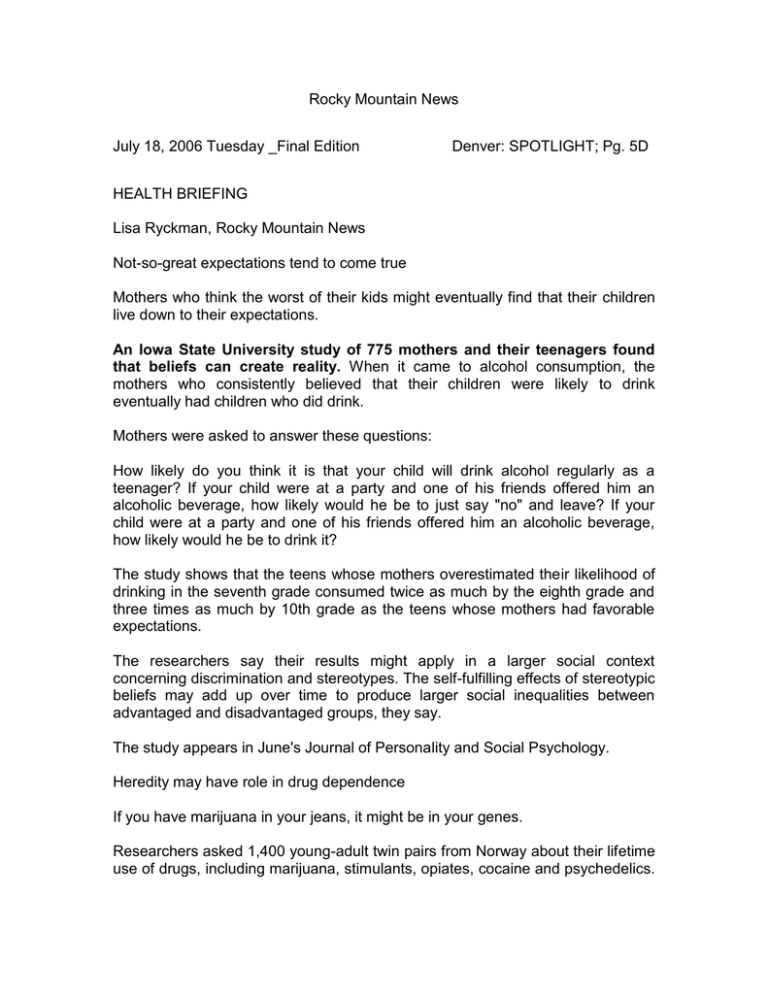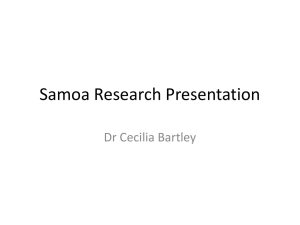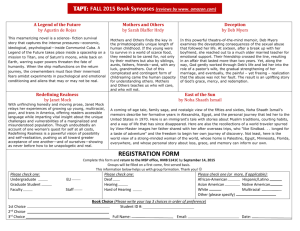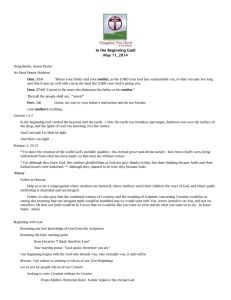Rocky Mountain News July 18, 2006 Tuesday _Final Edition
advertisement

Rocky Mountain News July 18, 2006 Tuesday _Final Edition Denver: SPOTLIGHT; Pg. 5D HEALTH BRIEFING Lisa Ryckman, Rocky Mountain News Not-so-great expectations tend to come true Mothers who think the worst of their kids might eventually find that their children live down to their expectations. An Iowa State University study of 775 mothers and their teenagers found that beliefs can create reality. When it came to alcohol consumption, the mothers who consistently believed that their children were likely to drink eventually had children who did drink. Mothers were asked to answer these questions: How likely do you think it is that your child will drink alcohol regularly as a teenager? If your child were at a party and one of his friends offered him an alcoholic beverage, how likely would he be to just say "no" and leave? If your child were at a party and one of his friends offered him an alcoholic beverage, how likely would he be to drink it? The study shows that the teens whose mothers overestimated their likelihood of drinking in the seventh grade consumed twice as much by the eighth grade and three times as much by 10th grade as the teens whose mothers had favorable expectations. The researchers say their results might apply in a larger social context concerning discrimination and stereotypes. The self-fulfilling effects of stereotypic beliefs may add up over time to produce larger social inequalities between advantaged and disadvantaged groups, they say. The study appears in June's Journal of Personality and Social Psychology. Heredity may have role in drug dependence If you have marijuana in your jeans, it might be in your genes. Researchers asked 1,400 young-adult twin pairs from Norway about their lifetime use of drugs, including marijuana, stimulants, opiates, cocaine and psychedelics. Researchers defined the significant lifetime use of illicit substances as 10 or more times. Virginia Commonwealth University scientists say previous twin studies of substance abuse have been done in countries that have high levels of drug use, such as the United States and Australia. Previous theories had suggested that genetic factors might be less important in societies where drugs are not widely available. But while Norway has low levels of illicit drug use, the results were similar, an indication that heredity plays a big role in drug dependence, researchers say. The study appears in July's Psychological Medicine. New procedure aids lung-cancer patients Lung-cancer patients who have been given a death sentence might have new hope. A Rhode Island Hospital study found that 57 percent of terminal lung-cancer patients who were treated with a nonsurgical procedure called thermal ablation survived three years afterward, which was two years beyond average life expectancy. Thermal ablation involves using imaging to insert a small needle into the tumor. Energy transmitted to the tip of the needle kills cancer cells with heat. The patients in the study were expected to die within a year and were not candidates for surgery, according to a team of specialists including a pulmonologist, a medical oncologist, a radiation oncologist and a thoracic surgeon. The study appears in the July Journal of Vascular and Interventional Radiology. Drug protects against heart-attack injury There's a new drug on the heart-attack horizon. Researchers say an antibiotic used to help organs survive transplants might prevent tissue damage after a heart attack. The Virginia Commonwealth University study found that rapamycin provides a protective effect against heart-attack injury and reduces programmed cell death. The same research team found earlier that the erectile-dysfunction drugs Viagra and Levitra helped protect the heart during experimental heart attacks in animals. The study appears in this month's Journal of Molecular and Cellular Cardiology, the official publication of the International Society for Heart Research.




